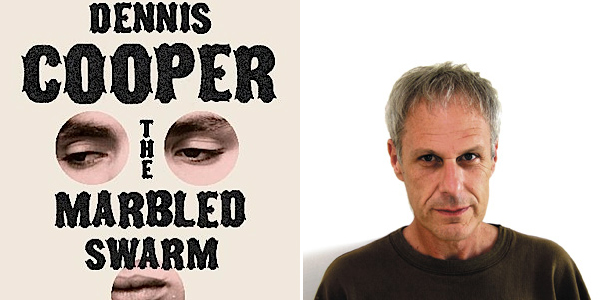My fear arouses me: an interview with Dennis Cooper
The odds are decent that you know Dennis Cooper better than I do. After hearing about his work for years and constantly promising myself that I would try a little someday, I found myself graduated from the MFA program with time to read books of my own choosing again, and so I finally started reading his novels, and I haven’t stopped in the few months since. You’ve already read in this space about his latest book, The Marbled Swarm, a ludicrously powerful book that you really need. After reading The Marbled Swarm I had to send him some painfully earnest fan mail, and he received this note with a grace and generosity that will surprise no one who has read his blog. I asked if I could interview him. He said yes. His answers are more than worth your time; the book demands it.
So I had a really frustrating experience buying The Marbled Swarm at a local independent bookstore. I saw that they had two copies of Blake Butler’s There Is No Year shelved where you would expect, and I figured it would be easy from there because a) you share a press and b) “Butler” is alphabetically pretty close to “Cooper.” After a long search, I had to go ask one of the bookstore employees. She said that your book was supposed to be shelved in gay fiction, with a question mark at the end of her statement. (I was there with my wife; the employee seemed skeptical that I would want a book from the gay fiction section. I was sort of furious about that whole interaction.) And it was there! Do you like being shelved under the category of gay fiction? Do you think it’s been helpful for your work, commercially or otherwise?
I’m always surprised and disappointed when my books are cordoned off like that. I can’t speak to the reasons why that store in particular shelved The Marbled Swarm there, obviously, but, in general, I think it’s the result of a longstanding habit.
When I published my first couple of novels in the late 80s and early 90s, there was this vogue among critics and publishers regarding the notion of ‘gay literature’. I think that was the point where literary arbiters first cottoned onto the idea that there was a historical trajectory involving the work of authors who happened to be gay that had been largely unexplored and was ripe for a thinkfest. Also, there was apparently a decent sized gay male readership of fiction at that time. I remember people in the publishing industry saying that any gay-themed novel was pretty much guaranteed to sell around 5000 copies, so quite a number of writers who happened to be gay were being swept up by major publishers and given small advances based on the logic that the books would at least earn back if not even make everyone involved a bit of money. I’m not sure if that was actually true or not. READ MORE >

